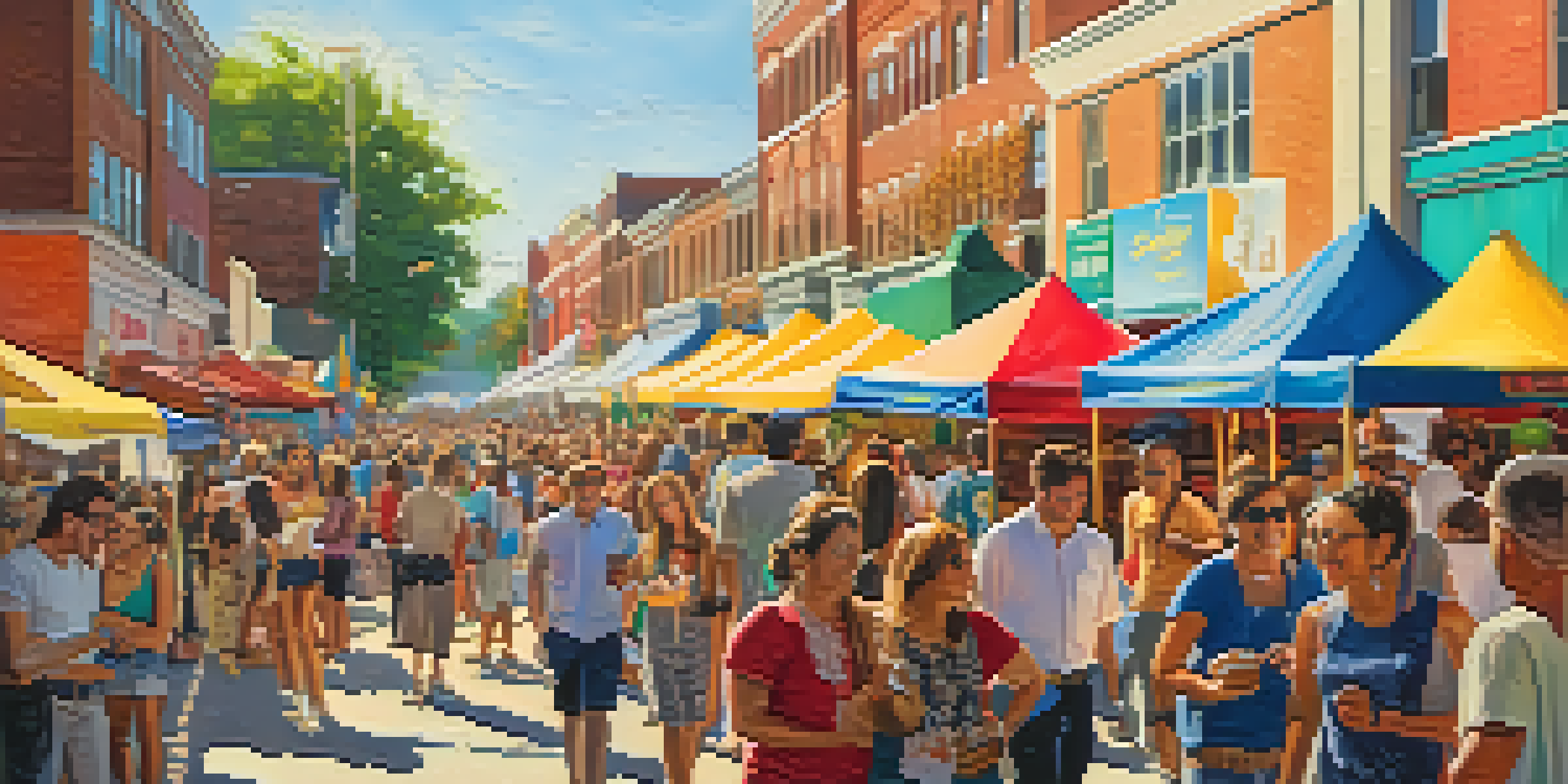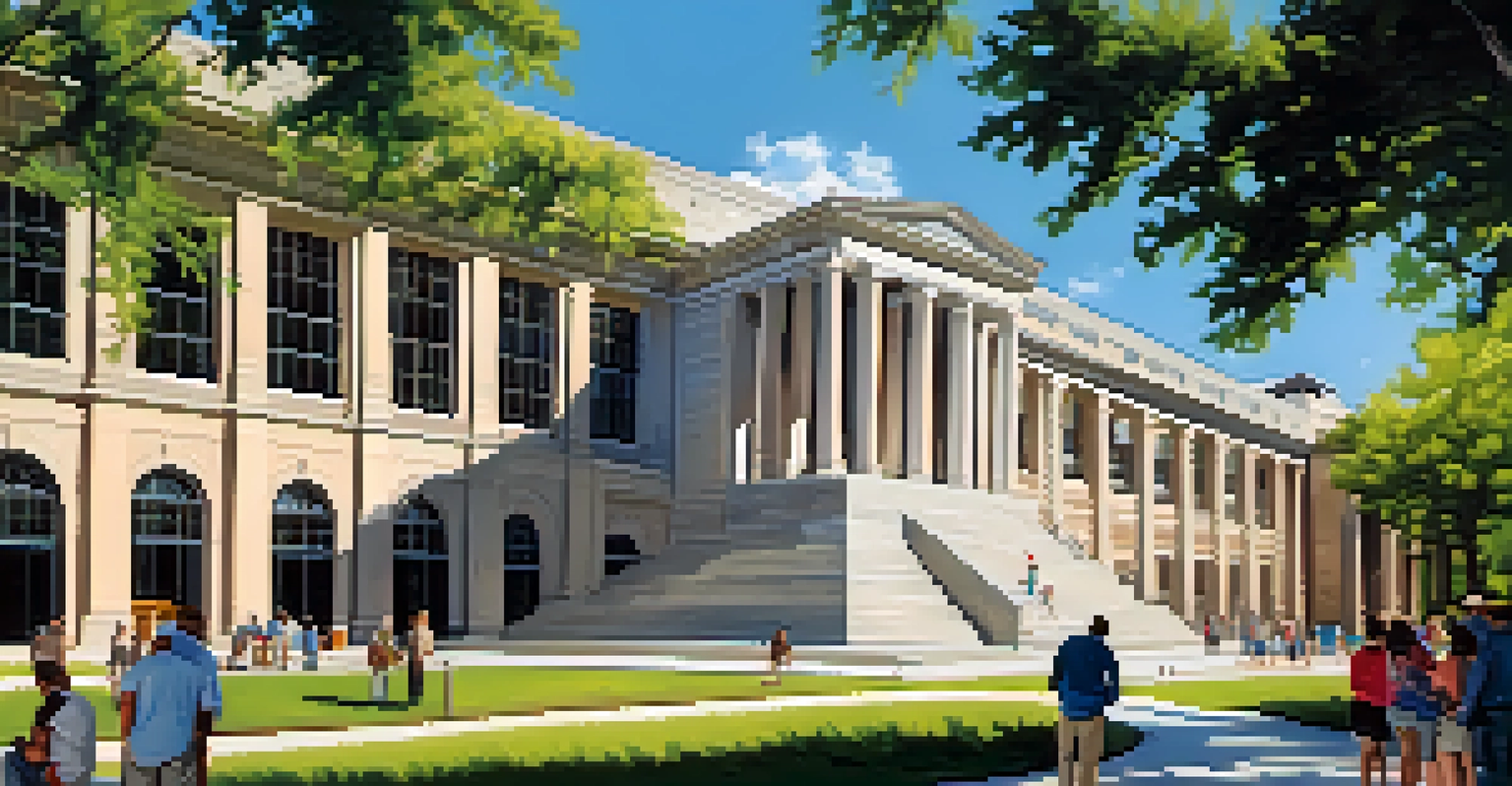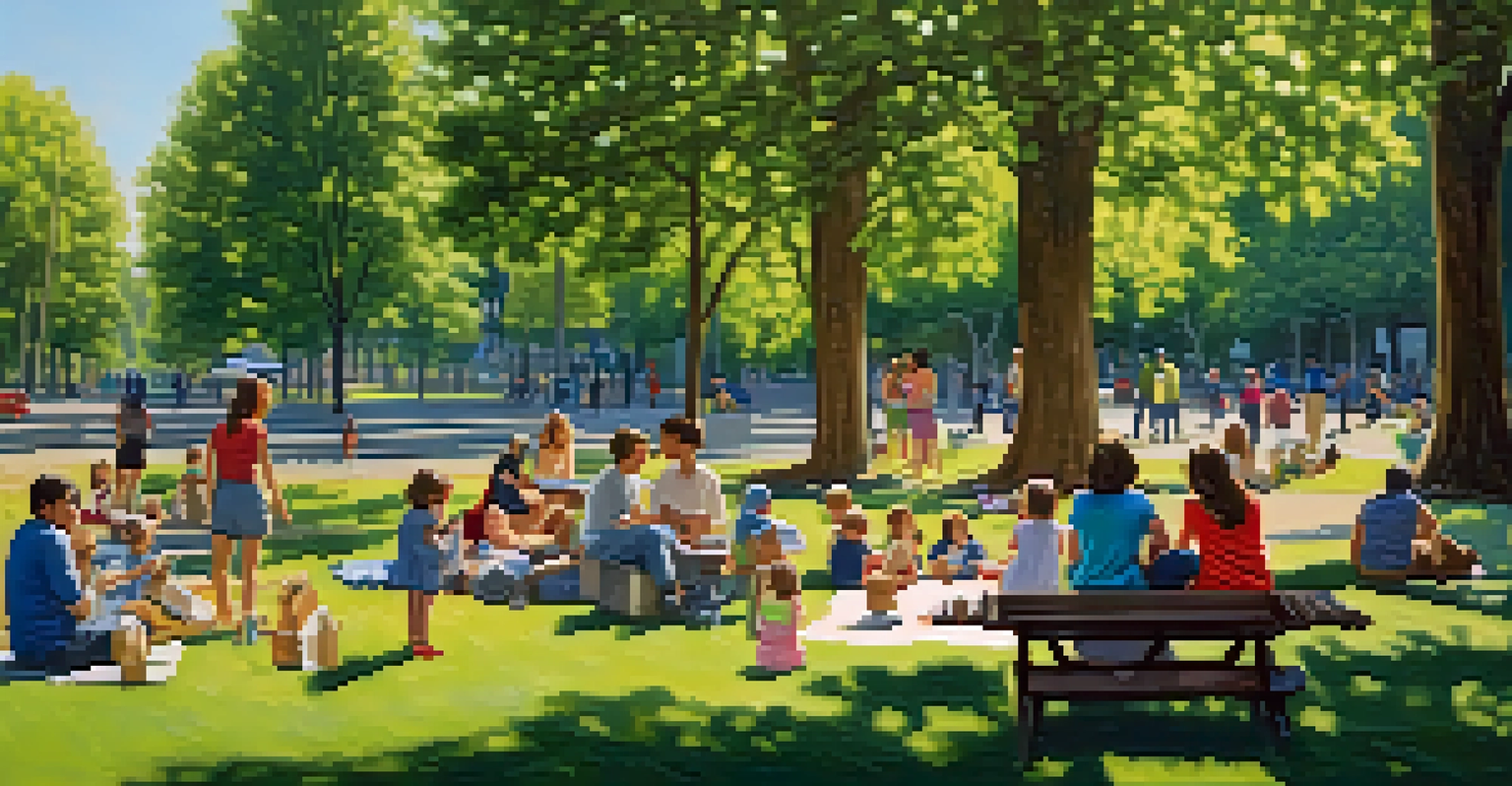Cultural Evolution of Raleigh: From Colonial to Modern Times

Colonial Beginnings: The Foundation of Raleigh's Culture
Raleigh's story begins in the 18th century when it was chosen as the capital of North Carolina. This decision was pivotal, as it set the stage for a unique cultural identity rooted in both colonial traditions and the aspirations of a growing state. The area's early settlements reflected a blend of indigenous influences and European customs, creating a vibrant tapestry of life.
Culture is the widening of the mind and of the spirit.
The establishment of Raleigh in 1792 was fueled by the desire to create a centralized political hub. As settlers poured in, they brought with them diverse traditions, languages, and practices, enriching the cultural landscape. This melting pot laid the groundwork for the city's evolving identity, where cooperation and collaboration became essential for survival and growth.
As the city developed, the early residents found ways to celebrate their heritage through festivals, local markets, and communal gatherings. These events not only fostered community spirit but also helped preserve the varied customs that would shape Raleigh's cultural evolution for generations to come.
The Antebellum Era: Growth and Challenges
During the antebellum period, Raleigh experienced significant growth and prosperity, driven largely by agriculture and trade. The development of railroads linked the city to broader markets, allowing for the exchange of goods and ideas. This era saw an influx of settlers, which transformed Raleigh into a bustling center of commerce and culture.

However, this growth came with challenges. The societal structure was heavily influenced by slavery, which created deep divides within the community. The cultural practices of the time were often dictated by these divisions, shaping everything from social gatherings to political discourse.
Raleigh's Cultural Foundation
Raleigh's culture is deeply rooted in its colonial beginnings, blending indigenous and European influences that shaped the city's identity.
Despite the challenges, the antebellum period also laid the groundwork for cultural institutions, such as schools and churches. These institutions played a crucial role in shaping the values and beliefs of the community, fostering a sense of identity that would endure through difficult times.
Civil War and Reconstruction: A Cultural Shift
The Civil War brought profound changes to Raleigh, as it did to much of the South. The city served as a Confederate capital, and the war's aftermath left deep scars on the community. The cultural landscape shifted dramatically, as residents grappled with loss, economic hardship, and the challenge of rebuilding their lives.
A community is like a ship; everyone ought to be prepared to take the helm.
Reconstruction efforts aimed to restore the city, but they often resulted in tensions between differing cultural groups. The struggle for civil rights and the push for educational opportunities were at the forefront of this era, reshaping Raleigh's cultural identity. New voices began to emerge, advocating for equality and inclusion.
Despite the struggles, the resilience of Raleigh's residents shone through. Cultural gatherings, community activism, and the establishment of new organizations began to redefine what it meant to be part of the Raleigh community, setting the stage for future progress.
The 20th Century: Innovation and Cultural Diversity
As the 20th century dawned, Raleigh entered a period of significant transformation. The establishment of institutions like North Carolina State University brought an influx of students and educators, fostering a culture of innovation. This not only enhanced the city’s educational landscape but also contributed to a more diverse and dynamic community.
The mid-20th century saw the civil rights movement gain momentum, further challenging the status quo. Raleigh became a focal point for activism, with citizens advocating for equal rights and social justice. This movement infused new cultural narratives into the city, emphasizing the importance of inclusion and representation.
Challenges and Resilience
Despite facing societal challenges, Raleigh's community has shown resilience through cultural institutions and events that foster unity and identity.
Moreover, Raleigh's arts scene began to flourish during this time. From music festivals to art exhibitions, the city embraced a variety of cultural expressions, reflecting its diverse population. This creative energy helped to unite residents and foster a sense of pride in their shared heritage.
Raleigh's Modern Era: Embracing Technology and Creativity
Entering the 21st century, Raleigh has positioned itself as a hub of technology and innovation. The Research Triangle Park, which includes Raleigh, has attracted tech companies and startups, creating a culture that values creativity and entrepreneurship. This technological shift is redefining what it means to live and work in the city.
As new industries emerge, so too does a wave of cultural diversity. Raleigh’s population continues to grow, drawing people from various backgrounds who contribute to the city’s vibrancy. Culinary scenes, arts festivals, and cultural events reflect this melting pot, showcasing an array of traditions and influences.
In addition, Raleigh has invested in public spaces and community initiatives that celebrate this diversity. Efforts to promote local artists and support cultural organizations have enriched the city's cultural fabric, creating an inclusive environment where all voices can be heard and appreciated.
Cultural Institutions: Preserving Raleigh's Heritage
Throughout its history, Raleigh has established a variety of cultural institutions dedicated to preserving its heritage. Museums, historical societies, and cultural centers play a vital role in educating residents and visitors about the city's past. These institutions serve as repositories of history, showcasing artifacts and stories that reflect Raleigh's unique journey.
The North Carolina Museum of History, for example, offers insights into the state's rich cultural narrative. Through exhibits and programs, it connects the past with the present, ensuring that the lessons of history are not forgotten. Such institutions foster a sense of pride and belonging among Raleigh's residents.
Embracing Diversity and Innovation
In the modern era, Raleigh thrives as a hub of technology and creativity, celebrating cultural diversity while integrating new trends and practices.
Moreover, these cultural institutions often collaborate with local artists and community organizations to promote cultural events. This partnership not only enhances the visibility of Raleigh's diverse heritage but also creates a platform for dialogue and understanding among its inhabitants.
Looking Forward: The Future of Raleigh's Culture
As Raleigh continues to grow and evolve, its cultural landscape remains dynamic and promising. The city is increasingly recognized for its commitment to fostering creativity, innovation, and inclusivity. This forward-thinking approach positions Raleigh as a model for modern urban development, where culture and community thrive together.
Emerging trends like sustainability and digital innovation are shaping Raleigh's future. These shifts not only influence the economy but also impact cultural practices, encouraging residents to engage with their environment in new ways. The integration of technology with traditional arts and culture is giving rise to exciting new forms of expression.

Ultimately, the future of Raleigh's culture lies in its ability to adapt while honoring its past. By celebrating its diverse heritage and nurturing creative talents, Raleigh is poised to continue its rich cultural evolution, ensuring that every voice contributes to the city's ongoing story.